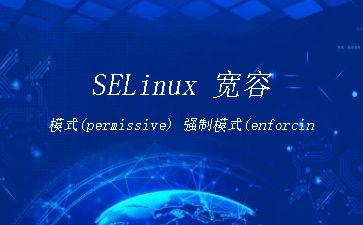在Android的root相关的文章里经常会看到关于SElinux,Android4.3以后引进SElinux。
SELinux 的启动、关闭与查看
1、并非所有的 Linux distributions 都支持 SELinux
目前 SELinux 支持三种模式,分别如下:
•enforcing:强制模式,代表 SELinux 运作中,且已经正确的开始限制 domain/type 了;
•permissive:宽容模式:代表 SELinux 运作中,不过仅会有警告讯息并不会实际限制 domain/type 的存取。这种模式可以运来作为 SELinux 的 debug 之用;
•disabled:关闭,SELinux 并没有实际运作。
2,查看SELinux的模式
# getenforce Enforcing <==就显示出目前的模式为 Enforcing
3,查看 SELinux 的政策 (Policy)
[root@master oracle]# sestatus
SELinux status: enabled <==是否启动 SELinux
SELinuxfs mount: /selinux <==SELinux 的相关文件资料挂载点
Current mode: enforcing <==目前的模式
Mode from config file: enforcing <==设定档指定的模式
Policy version: 21
Policy from config file: targeted <==目前的政策为何?
4,通过配置文件调整SELinux的参数
[root@www ~]# vi /etc/selinux/config
SELINUX=enforcing <==调整 enforcing|disabled|permissive
SELINUXTYPE=targeted <==目前仅有 targeted 与 strict
5,SELinux 的启动与关闭
【重要常识】上面是预设的政策与启动的模式!你要注意的是,如果改变了政策则需要重新开机;如果由 enforcing 或 permissive 改成 disabled ,或由 disabled 改成其他两个,那也必须要重新开机。这是因为 SELinux 是整合到核心里面去的, 你只可以在 SELinux 运作下切换成为强制 (enforcing) 或宽容 (permissive) 模式,不能够直接关闭 SELinux 的!
同时,由 SELinux 关闭 (disable) 的状态到开启的状态也需要重新开机啦!所以,如果刚刚你发现 getenforce 出现 disabled 时, 请到上述文件修改成为 enforcing 吧!
【重点】如果要启动SELinux必须满足以下两个点:
所以,如果你要启动 SELinux 的话,请将上述的 SELINUX=enforcing 设定妥当,并且指定 SELINUXTYPE=targeted 这一个设定, 并且到 /boot/grub/menu.lst 这个文件去,看看核心有无关闭 SELinux 了呢?
[root@www ~]# vi /boot/grub/menu.lst
default=0
timeout=5
splashimage=(hd0,0)/grub/splash.xpm.gz
hiddenmenu
title CentOS (2.6.18-92.el5)
root (hd0,0)
kernel /vmlinuz-2.6.18-92.el5 ro root=LABEL=/1 rhgb quiet selinux=0
initrd /initrd-2.6.18-92.el5.img
如果要启动 SELinux ,则不可以出现 selinux=0 的字样在 kernel 后面!
【问题】通过上面的学习我们知道,如果将启动着的SELinux改为禁用,需要重启电脑,我们不想重启电脑又不想开启SELinux该怎么办呢?
【答案】将强制模式改为宽松模!
[root@www ~]# setenforce [0|1]
选项与参数:
0 :转成 permissive 宽容模式;
1 :转成 Enforcing 强制模式
范例一:将 SELinux 在 Enforcing 与 permissive 之间切换与查看
[root@www ~]# setenforce 0
[root@www ~]# getenforce Permissive
[root@www ~]# setenforce 1
[root@www ~]# getenforce Enforcing
6,查看已启动程序的type设定
[root@master oracle]# ps aux -Z
LABEL USER PID %CPU %MEM VSZ RSS TTY STAT START TIME COMMAND
system_u:system_r:init_t root 1 0.0 0.4 2060 520 ? Ss May07 0:02 init [5 system_u:system_r:kernel_t root 2 0.0 0.0 0 0 ? S< May07 0:00 [migra] system_u:system_r:kernel_t root 11 0.0 0.0 0 0 ? S< May07 0:00 [kacpi] system_u:system_r:auditd_t root 4022 0.0 0.4 12128 560 ? S<sl May07 0:01 auditd system_u:system_r:auditd_t root 4024 0.0 0.4 13072 628 ? S<sl May07 0:00 /sbin/a system_u:system_r:restorecond_t root 4040 0.0 4.4 10284 5556 ? Ss May07 0:00 /usr/sb
说明:其实这些东西我们都不用管,都是SELinux内置的。只要学会在强制和宽松模式间转换就行了!
小结附:
关闭SELinux的方法:
修改/etc/selinux/config文件中的SELINUX=”” 为 disabled ,然后重启。
如果不想重启系统,使用命令setenforce 0
注:
setenforce 1 设置SELinux 成为enforcing模式
setenforce 0 设置SELinux 成为permissive模式
在lilo或者grub的启动参数中增加:selinux=0,也可以关闭selinux
查看selinux状态:
/usr/bin/setstatus -v
如下:
SELinux status: enabled
SELinuxfs mount: /selinux
Current mode: permissive
Mode from config file: enforcing
Policy version: 21
Policy from config file: targeted
getenforce/setenforce查看和设置SELinux的当前工作模式
查看SELinux状态:
1、/usr/sbin/sestatus -v ##如果SELinux status参数为enabled即为开启状态
SELinux status: enabled
2、getenforce ##也可以用这个命令检查
关闭SELinux:
1、临时关闭(不用重启机器):
setenforce 0 ##设置SELinux 成为permissive模式
##setenforce 1 设置SELinux 成为enforcing模式
2、修改配置文件需要重启机器:
修改/etc/selinux/config 文件
将SELINUX=enforcing改为SELINUX=disabled
重启机器即可
今天的文章SELinux 宽容模式(permissive) 强制模式(enforcing) 关闭(disabled) 几种模式之间的转换分享到此就结束了,感谢您的阅读。
版权声明:本文内容由互联网用户自发贡献,该文观点仅代表作者本人。本站仅提供信息存储空间服务,不拥有所有权,不承担相关法律责任。如发现本站有涉嫌侵权/违法违规的内容, 请发送邮件至 举报,一经查实,本站将立刻删除。
如需转载请保留出处:https://bianchenghao.cn/68441.html

